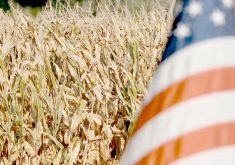The Canadian Food Inspection Agency is sowing confusion in the grain milling business by sending conflicting signals about rules governing fusarium in wheat, milling officials have complained.
The House of Commons agriculture committee summoned milling, farm and regulator officials to Parliament Hill Oct. 20 to investigate confusion in Prince Edward Island this year after farmers thought Dover Flour had decreased the level of fusarium damage that could disqualify wheat from the system. Some dumped their wheat, assuming it was not acceptable under new rules.
It turned out the incident was the result of poor communication, but millers are concerned about recent CFIA actions.
Read Also

Organic farmers urged to make better use of trade deals
Organic growers should be singing CUSMA’s praises, according to the Canadian Chamber of Commerce.
No Canadian regulations exist governing hard wheat levels of vomitoxin produced by fusarium head blight, but Derek Jamieson, chair of the National Millers’ Association and vice-president of P&H Milling Group that includes Dover, told MPs CFIA is enforcing stepped-up compliance and enforcement standards.
“We are alarmed and concerned about being subject to enforcement over guidelines that do not exist,” he said.
CFIA advice to Agriculture Canada and the industry has offered different versions of what the rules will be, he said, including possible zero tolerance for vomitoxin even though Canadian rules assume it can and does exist in small amounts. There are rules for its presence in white wheat.
“We require regulations that are clear and guidelines that are meaningful and achievable,” Jamieson said.
Miller association president Gordon Harrison offered concrete examples.
He said a mill in New Brunswick has received a notice from CFIA that is unique in the industry.
“It’s been told to adhere to a certain standard based on something in the United Kingdom,” he told MPs.
“I can’t tell you how frustrating and how difficult it is.”
CFIA changed rules?
Harrison said CFIA has changed the way it does business with mills on the fusarium issue, even as Health Canada reviews its standards on human health from fusarium contamination.
“CFIA has an active compliance and enforcement program that we take issue with,” he said.
“Mills are being faced with new constraints that are being done on an ad hoc basis.”
Agriculture Canada and Health Canada recently agreed to establish a new cross-industry working group to discuss proposed changes to fusarium-tolerance regulations.
Robert Charlebois, a senior CFIA official, said erroneous media reports from Prince Edward Island suggested the agency had suddenly changed the threshold for fusarium toxins.
“This is not accurate.”
He said Health Canada sets the tolerance levels, which CFIA enforces in the grain industry.
But despite miller evidence to the contrary, MPs did not pursue the issue with Charlebois.
Wheat growers from the National Farmers Union, the Western Canadian Wheat Growers Association and the Atlantic Grains Council pleaded for clarity and caution when there are proposals to lower tolerance levels or tighten enforcement. No one said they advocate lowering standards.
WCWGA Saskatchewan vice-president Geoff Hewson urged that existing regulations remain in place until the need for and consequences of change are reviewed.














